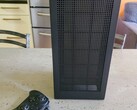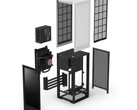Update February 2: NZXT CEO Johnny Hou has formally apologized for the H1 fire hazard and the insufficient fix offered. The case is to be removed from sale, new PCIe risers are to be sent out to current H1 owners, and the company will also offer a full refund for those who bought the unit from NZXT and want to return it. Hou even included a note of gratitude to the team at Gamers Nexus who insisted a proper solution was required that didn't involve potential risk.
Original story:
The NZXT H1 case has come under fire, literally, through two extremely thorough testing videos posted by Gamers Nexus. There had been reports about some units bursting into flames, so the testers decided to see if they could replicate the issue and then attempt to diagnose the problem themselves, which would then be shared with the California-based computer manufacturer.
In the first video, the presenters explained how they believed the thread of one of the metal screws holding the PCIe riser in place in the NZXT H1 was possibly connecting with trace in the PCB, thus creating a short circuit. As Steve and Patrick conducted their experiment the NZXT H1 caught on fire as they expected it to. It’s reasonable to conclude that the resulting conflagration could trigger a full-blown house fire, as the flames that licked the sides of the malfunctioning case certainly appeared to have that catastrophic potential.
Gamers Nexus shared their findings with NZXT, which proceeded to issue a product recall and halted sales of the H1. However, the company’s “slimy” method of dealing with the situation left the Gamers Nexus team incensed, leading to a second video investigating the effectiveness of NZXT’s solution for the problem: Plastic screws. Obviously this time, the “new” NZXT H1 case with the non-conductive screws didn’t catch on fire, but Gamers Nexus felt this solution was insufficient for a variety of reasons.
In a nutshell, anyone either using an older case with the metal screws or the new one with the plastic screws, who did not have knowledge of this fire hazard, would still be under risk of having a fire break out in their living space. Holes made in the PCIe riser PCB are not plated, and as screws are loosened or tightened, the thread wears down the PCB material, as is shown clearly in the videos from Gamers Nexus. Eventually, the worn-down material exposes power-conducting copper trace that will cause a short circuit when in contact with a metal screw thread. Steve Burke, the video's host, perfectly describes it as a “crapshoot”, because it really depends on how much the screw has been tightened whether it makes a hazardous connection or not.
While the nylon screw workaround is a reasonable temporary fix, it does seem like it would be much wiser for NZXT to completely replace the PCIe riser in the H1 and recall the old parts (both the new model and recalled model use the same PCIe riser PCB revision). Someone selling a unit on might forget to tell the new owner about the issue, and if one of the plastic screws breaks, an unwitting user might be tempted to replace the broken part with a metal screw, instantly resulting in a fire hazard. It’s a shocking revelation that has been rightly outed by Gamers Nexus.


 Deutsch
Deutsch English
English Español
Español Français
Français Italiano
Italiano Nederlands
Nederlands Polski
Polski Português
Português Русский
Русский Türkçe
Türkçe Svenska
Svenska Chinese
Chinese Magyar
Magyar












